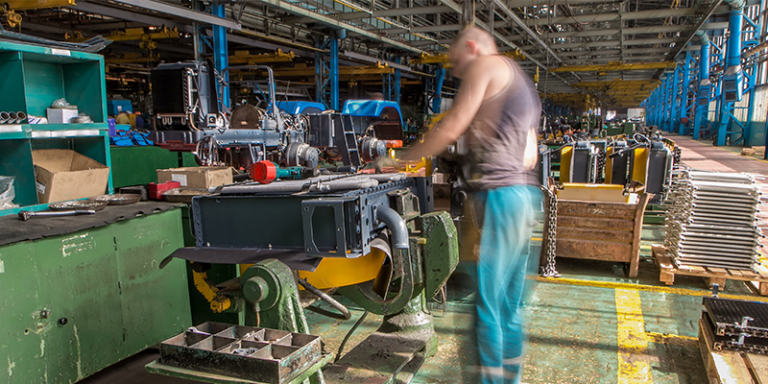Advocates of free trade must grapple with its downsides
11 July 2022
We speak to former Chief Economist of the World Bank, Penny Goldberg, about the need to understand the importance of place and community when advocating for policy change.

Gone are the days when presidents and prime ministers spoke confidently about the unbound possibilities of free trade or the global opportunities of trade liberalisation. If political rhetoric is to be believed, we are entering a period of de-globalisation. And yet what do the thinkers and economists who have shaped trade policy for the last 30 years think? And do they still have a voice in the debate?
Penny Goldberg spoke to me over zoom from her home in New York, where she reflected on what initially made her care about the economics of trade.
‘I’m from Greece. When I was growing up, most Greeks would strive to become engineers. But as Greece started growing, it became clear that you didn’t need just bridges and roads, you also needed economic expertise. I was particularly interested in trade like many people from small countries because if you're from a small country, then trade is essential for growth and development. If you're from a country like Greece, you have no choice, you can't survive unless you are open.”
Having just spent two years as Chief Economist of the World Bank, Goldberg knows more than most about the political trade-offs and geopolitics of trade “Free trade sounds wonderful, but there is also a downside. There are distributional impacts, and we need to take those seriously,” she says.
In the 1990s and early 2000s, most of Goldberg’s work focused on Latin America, examining the effects of trade liberalisation episodes. “This was the age of hyper-globalisation”, she reminds us. “There was a powerful sentiment amongst trade economists that we had entered a new era.” The prevailing consensus was that globalisation would be an unstoppable economic force, with new technologies, the decline of transportation costs and an increasingly global political order creating unprecedented opportunities.
And yet that world now feels upended by a decade of populist political movements and increasingly destabilising political events.
Goldberg doesn’t shy away from the debate. She acknowledges that economists need to understand the effects of free trade on people's lives experience. “There is a spatial dimension to the effects of trade, which may suggest a case for place-based policies. Place-based policies are highly controversial for a good reason: in many cases, they have been shown to foster inefficiency. But we need to acknowledge that people are not as mobile as we think. It takes time for them to move across regions or to move across jobs. One potential way to help is by supporting the communities, by supporting the places where they live - that is a direct policy implication of recent research findings that highlight the importance of the geographical dimension.”
For many in the political world, the case for place-based policy will seem stronger than that. “At this point, there is a lot of scepticism about whether trade is beneficial or not,” Goldberg accepts. But she remains firm in her view that open economies are always to be preferred to closed ones.
“Despite the concerns we currently have about remaining open, openness should be a top priority for two reasons: First, trade contributes to lower prices – it is useful to remember this as prices are rising now all over the world. Second, and perhaps more importantly, in a dynamic, constantly changing world, it is important for a country to embrace new ideas and innovation. This is unlikely to happen unless the country keeps its borders open and its economy open to foreign competition. There is a tendency these days to close the economies, to turn inward, but we need to resist it.”
For Goldberg this is not a choice between caring for those whose lives are affected by the ups and downs of global trade or not. It is, instead, informed by a strong belief that everyone’s interests are best served by openness. Goldberg urges her colleagues to engage in the complexity and unequal effects of trade, in order to defend it effectively. ‘I think one thing that we could do better is be more honest with people when we talk about the effects of trade. There are many economists, trade economists in particular, who appear dogmatic when it comes to trade. They say for instance, you can never admit that trade could have any adverse distributional impacts because the moment you say that protectionists will take advantage – you give them an inch, they will take a mile... However, when economists say things that are contrary to people's experiences, then they have zero credibility.’
I can’t help but think Goldberg's emphasis here goes back further than recent political discontent. Perhaps it even owes something to her underpinning belief in the need for everyone to have a voice, be that those small nations like Greece or the communities of post-industrial America. Whatever the root cause, she remains hopeful. “I think our time is challenging in many ways but is it worse than other times in the past? No. The world goes through ups and downs, and I'm sure it will come back to a good state: overall, the trend is a rising trend. I think the world today is a much better place than it was 50 years ago, not to mention 100 years ago. I do believe in this long-term positive trend. Despite all the challenges we've experienced in the last few years, I still think we're much better off than we were in the past.”
Pinelopi ‘Penny’ Koujianou Goldberg is the Elihu Professor of Economics at Yale University. She is a former Chief Economist of the World Bank Group, former Vice-President of the American Economic Association and current President of the Econometric Society.
 Close
Close

